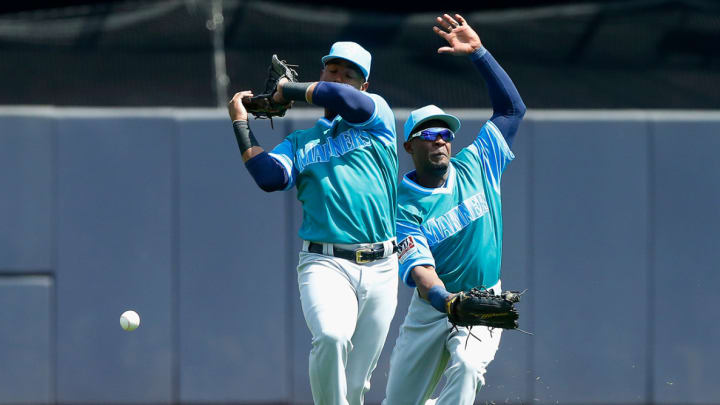The Mariners Had a Horrible, No Good, Very Bad First Inning

The Mariners are in the thick of the AL wild card hunt, but Sunday afternoon at Yankee Stadium, they bore more of a resemblance to a Little League team, albeit not one good enough to play for the championship at Williamsport. Their defensive ineptitude led to a five-error first inning—the first such inning in the majors in 40 years—during which the Yankees scored six runs.
Spotted a 1-0 lead against Masahiro Tanaka, Mariners starter Andrew Albers retired leadoff hitter Aaron Hicks on a popup, but then surrendered a ringing double off the rightfield wall to Starlin Castro. The real trouble began when Gary Sanchez lashed a single to leftfield, where Ben Gamel let the two-hopper graze off the end of his glove. The ball rolled to the warning track as Castro scored and Sanchez took second as Gamel was charged with error No. 1.
Watch: Marlins OF Giancarlo Stanton Hits 50th HR of Season
After slumping Aaron Judge worked a five-pitch walk, Didi Gregorius followed with a popup to shallow left centerfield, where shortstop Jean Segura, who was battling the sun, called for the ball. With Gamel and centerfielder Guillermo Heredia converging, Segura pulled back at the last second and missed the catch—error No. 2—which loaded the bases. Chase Headley fell behind 0-2, then hit a routine grounder to third baseman Kyle Seager, a former Gold Glove winner. Looking toward second base as he fielded the ball, apparently thinking of an around-the-horn double play or at least a force out (why not at third base?), he instead bobbled the ball twice while attempting to transfer it to his right hand. That was error No. 3, and it advanced the runners 90 feet, scoring the go-ahead run.
No doubt already frustrated by this particular clown show, manager Scott Servais went out to the mound to give his pitcher and infield a pep talk. Albers responded by striking out Todd Frazier for the second out, but Jacoby Ellsbury blooped Albers’ first pitch into left center, easily scoring both Judge and Gregorius. The play—which you can see here in its entirety—appeared to be winding down as Gamel relayed the ball back to Segura, but the shortstop dropped what was an admittedly lazy one-hop throw for error No. 4. When Headley alertly broke for home, Segura backfooted a wild one-hopper toward home plate, where the ball skipped past catcher Mike Zunino for error No. 5 and the fifth New York run.
Ellsbury took third on that play, then scored the sixth run when Ronald Torreyes hit a grounder to the left side that could have easily produced error No. 6. Seager, ranging to his left, skidded to his knees and popped up with the ball, then one-hopped a throw that pulled first baseman Yonder Alonso off the bag. The official scorer apparently ruled that Torreyes’ speed was enough to credit him with a hit. Finally, Hicks hit routine fly out to centerfield to end the debacle.
Best Team Ever Standings: How 2017 Dodgers Compare To 1906 Cubs, 2001 Mariners, More
Via ESPN Stats and Info and Elias Sports, the last team to commit five errors in an inning was the 1977 Cubs. A bit of digging reveals that they did so in a July 2 game against the Cardinals, also in the first inning; pitcher Bill Bohnam and second baseman Manny Trillo—the latter of whom would later win three Gold Gloves and set a record for consecutive errorless games and chances—made two errors apiece in that frame, and Trillo added another later in the game, which saw the Cubs make a whopping seven errors. Speaking of Cubs, in 2011, Castro was the last shortstop before Segura to make three errors in a single inning.
What was surprising about the Mariners’ sloppy Sunday—which resulted in a 10-1 loss that dropped them to 66-65, 1.5 games out of the second AL wild card spot—was that they’ve actually been a very solid defensive team. Their 78 errors and +2 Defensive Runs Saved coming in both ranked in the middle of the AL pack, while their .705 defensive efficiency, the rate at which they turn batted balls into outs, ranked first. They just picked a bad time to have one of those days.

Jay Jaffe is a contributing baseball writer for SI.com and the author of the upcoming book The Cooperstown Casebook on the Baseball Hall of Fame.